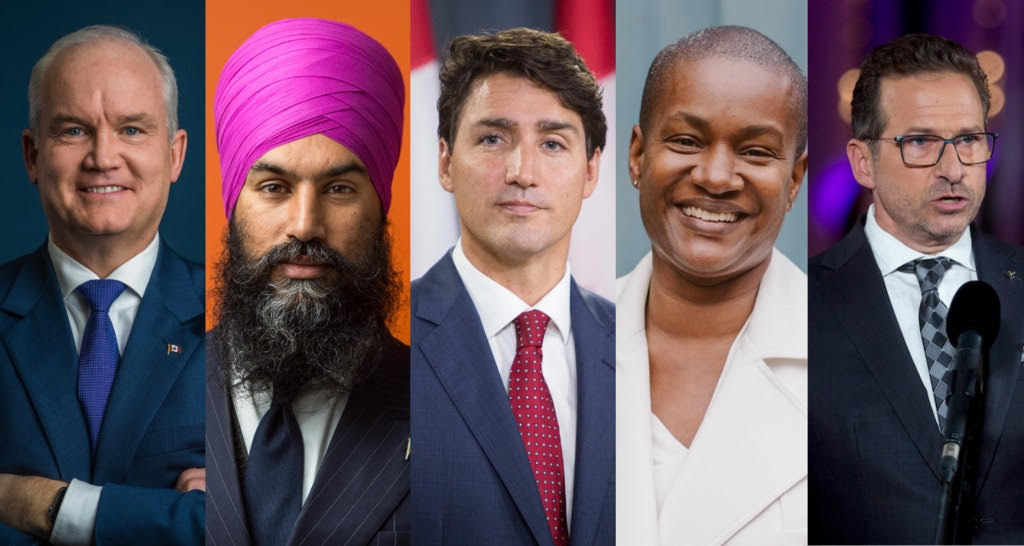Support strong Canadian climate journalism for 2025
It's no surprise that Canadians aren't swooning over Justin Trudeau anymore, if they ever did. That over-worked trope was always annoyingly sexist anyway. Nobody needs this election, and we're tired.
From the confirmation of Indigenous children's unmarked graves, to terrifying fires, to a catastrophic evacuation from Kabul, to protesters blocking ambulances at hospitals, it's been one helluva summer.
Still, one hopes Canadians will be clear-eyed about the sobering consequences of the choice we face as a nation on Monday. The government waiting to be sworn in will be either Liberal or Conservative.
Can we please focus now?
This pandemic is still with us. Alberta, the flagship province that most embodies the CPC zeitgeist, just declared a state of emergency as its ICUs collapse and 24 people died in a single day.
And this summer almost 600 British Columbians perished in a heat wave that sparked wildfires that burned over half a million hectares to the ground, including whole towns. Plural.
Climate and Covid must command our full attention as citizens.
We will not see the back of Covid in this country without vaccine mandates. Full stop.
We must establish climate policies that meet or exceed our 2030 Paris commitments. Full stop.
There are excellent reasons to vote for either the NDP or Green Party. There are no defensible reasons to vote PPC, whose masterful campaign-by-tantrum dominated news coverage. The laissez-faire mantra of the CPC has shown itself to be manifestly unsuited to meeting moments of great crisis.
Which brings us back to Justin Trudeau and the Liberals.
If there's one lesson we should have learned as a nation these last two years, it's the indispensable role of government. It was good government that delivered CERB benefits into millions of Canadians' bank accounts within weeks of the 2020 lockdown.
It was good government that set up emergency access to capital for Canadian businesses and non-profits, and assured the public that the federal government would see them through to the pandemic's end.
It was good government that procured more than enough vaccines to immunize the entire nation in a timely way, and it is good government to impose a vaccine mandate wherever practicable.
It is good government to introduce a national $10 a day child-care plan.
(It is not good government to fight residential school survivors in court).
We should put to rest forever the notion that taxes and government are inherently bad. We could not have survived Covid without them, nor will we conquer the climate emergency.
On the climate score, it's arguable that the Trudeau government's performance has long been under-rated. This is a somewhat self-inflicted wound, as the party's own focus on Justin Trudeau obscures outstanding leadership of Catherine McKenna and Jonathan Wilkinson in Canada's environment and infrastructure portfolios.
Notably, former BC Green Party leader Andrew Weaver endorsed the Liberal climate platform as "a plan that reflects the urgency and scale of the crisis." Weaver was a lead author of the IPCC 2nd, 3rd, 4th, and 5th scientific assessments, and former chief editor of the Journal of Climate.
And respected independent experts Mark Jaccard and Katharine Hayhoe have also awarded high marks to the Liberals, while expressing dissatisfaction with the NDP and Green Party plans to achieve laudably ambitious goals.
Dr Jen Winter has also criticized the vagueness of the NDP, though she's less enthusiastic in her assessment of the Liberal platform.
For this, these scholars have been subjected to relentless personal attack on social media, but little substantive response, with the exception of this spirited response to Jaccard from Seth Klein in these pages.
Missing from Jaccard’s assessment is an analysis of power, particularly as it plays out within the Liberal party. That’s a problem because, without that framework, one has no understanding of how and why it is that the Liberals consistently promise to do things in an election (campaign from the left) and then fail to follow through (govern from the right).
Jaccard, not to be outdone, swiftly replied:
"Above all, don’t be tricked by ambitious targets with vague policy statements. Climate-insincere politicians learned early that naive voters would reward them for promising dramatic GHG reductions in a short time, which they subsequently never achieved once in office. This has been a deception by politicians across the political spectrum — Conservatives, Liberals, and the NDP."
Among progressives and climate activists, the Liberals abandoned credibility with their purchase of the TMX pipeline. Yet environmental law professor Martin Olszynski offers the intriguing take that this move averted a national unity crisis in the west.
Does anyone else wish that we'd had a lot more attention to this level of debate, and less coverage of howling anti-vaxxers this election?
At this moment, in this election, and for the rest of our lives, climate is too important to be an electoral after-thought.
While many academics conclude that the Liberal Party's policy commitments show the best path to meeting our Paris commitments, Seth Klein is right that we must do more. The alarms from fires, floods and tornadoes ring louder every year.
And methods matter more than sentiment.
It is entirely fair game to push the NDP and Greens to produce credible pathways to the goals they promise voters. In our all-too-common cynical response to Liberal climate policies, we've had a blind spot about the failure of progressives to produce solid achievable mechanisms for change.
In the decades ahead, when we look back on this fateful time, we will not wish for a moment that we'd done less. We'll regret every year we cede power to the CPC, which put climate activists on a terrorist watch list, and subjected them for years to a vindictive CRA witch-hunt.
Count this voter in for supporting every ounce of pressure we can put on the Trudeau Liberals to deliver more and better results on climate. Perhaps a minority government is the best check voters have.
When you go to the polls, remember that we will have a Liberal or CPC government. Vote like you'll make all the difference, because you do.






Comments
As long we are counting endorsements for the Liberals' climate plan…
Trudeau's climate policy defies recent reports by the Int'l Energy Agency (IEA) and IPCC.
The 2018 IPCC Special Report on Global Warming of 1.5°C warns that the world must nearly halve GHG emissions by 2030 and eliminate them by 2050 to keep warming below the danger limit of 1.5 C.
IEA's Net-Zero by 2050 report says no new investment in fossil fuels after this year to contain global warming to 1.5 C.
The Liberals reject the IEA's conclusions and every IPCC report likewise. So does the oil industry.
*
Climate Action Tracker's 2021 report rates Canada's efforts overall as "highly insufficient". (Same rating as in 2011 and every year but one in the last decade.)
• climateactiontracker.org/countries/canada/
*
The OECD, the UN, and the federal Environment Commissioner all warn Canada is NOT on track to meet its targets. The main stumbling block? Increasing oilsands emissions.
OECD: "Without a drastic decrease in the emissions intensity of the oilsands industry, the projected increase in oil production may seriously risk the achievement of Canada's climate mitigation targets."
http://www.cbc.ca/news/politics/oecd-canada-climate-report-card-1.44553…
*
"Pembina Institute and Simon Fraser University’s School of Resource and Energy Management assessed every province, territory and the federal government on 24 indicators that are foundational to climate success. The findings are published in 'All Hands on Deck: An assessment of provincial, territorial and federal readiness to deliver a safe climate'. The analysis found that NOT A SINGLE GOVERNMENT is fully prepared to help deliver a safe climate…"
"Without a Team Canada approach on climate, we risk getting left behind" (National Observer, July 28th 2021)
https://www.nationalobserver.com/2021/07/28/opinion/team-canada-approac…
Would Andrew Weaver, Mark Jaccard, and Martin Olszynski, and other Liberal climate plan supporters please explain how oilsands expansion is compatible with Canada's climate targets? Show us the math.
The Liberals have proved far more effective than the Conservatives in delivering on Big Oil's and Corporate Canada's agenda. Trudeau & Co. have persuaded many Canadians that we can both act on climate and double down on fossil fuels. Trudeau and Notley moved the ball on the Trans Mountain pipeline down to the ten-yard line. Their signal achievement was to "push country-wide support for pipelines from 40% to 70%." Something Harper, Scheer, O'Toole, and Kenney could never dream of.
The oil & gas industry, corporate Canada and the Big Banks, and both the Liberal and Conservative parties are banking on global climate action failure. The only scenario in which oilsands expansion makes sense. Between Liberals and Conservatives, the only choice for voters is how fast we drive over the climate cliff.
*
"The only thing necessary for the triumph of evil is for good men to do nothing." By endorsing the Liberal's plan to fail on climate, good men and women enable climate disaster. Let future generations be the judge.
For now, count on four more years of disappointment.
Thanks Geoffrey for your take-down of the Liberals' hypocrisy and contradictory policies. Here's my own take on voting strategically for the climate -- elect potentially winnable 'climate champions' within the Parliamentary parties, mainly the NDP and secondarily the Greens, in the context of a minority government, as a way to leverage influence. Besides the list of the candidates endorsed by 350.org and LeadNow, Dogwood BC has compiled a list of about 200 candidates who pledge to do whatever they can to stop the Trans Mountain pipeline.
https://rabble.ca/blogs/bloggers/greening-news/2021/09/how-strategicall…
Ms. Garossino argues correctly that good government is important, but then, rather than simply endorsing the Liberals, she suggests that they should continue to be hobbled by a minority situation supported by the NDP whose only strength is political posturing, taking credit for the accomplishments of others and which is completely lacking in the talent and skills to do any of these things on their own.
If you want good government, elect a Liberal majority, and if you actually believe that the Liberals haven't accomplished much in the last six years, read "Our Progress" on the Liberal web page to see just what they've accomplished. It's not nothing. It's a lot.
No. You are wrong on numerous counts here;
In the past six years, housing has become less accessible, the trajectory of emissions remains unsustainable, there are still boil water advisories on reserves, and my vote as a progressive is still wasted because they reneged on their PROMISE of electoral reform. Of course you will read Liberal hagiography if you look to to their site; they will not speak ill of themselves because that would be to admit their numerous and consequential failures.
To judge them by the barest minimum of competent governance is to give them a pass. But that is not enough, and we do ourselves no favours by pretending that it is enough nor by lying to ourselves that the only acceptable option is to continue to prop up their lame and insufficent style of governance lest we face the disaster of a return to a conservative government.
I reject your assertion that the NDP's only strength is in posturing and in taking the credit for others. Your assertion that they lack the skills to govern is entirely baseless and presented without evidence.
The last Liberal majority did not bring the kinds of social and governance changes needed in an increasingly hot and destabilized world, and to pretend that they did is to parade ignorance.
Bring on another minority.
http://www.revparl.ca/english/issue.asp?param=121&art=727
"Lynn McDonald, in her The Party That Changed Canada......claims..that the NDP (and its forerunner the CCF) has had a profound impact on shaping the political, the social, and economic affairs of Canada, even though it has never formed either the government or the official opposition at the national level.
According to McDonald, programs such as medicare, old age pensions, job creation and unemployment insurance, civil rights legislation, and cultural entities including the CBC, trace their origins to the CCF, not the parties which were in power when these measures were introduced. In fact, McDonald claims these programs, which have indeed "changed Canada", were resisted by the implementors and adopted only because cynical Liberal and Conservative prime ministers saw the electoral capital."